by Didem Danış, 5.7.2017
I saw lightning in the east
in a wink
then west
I saw the sun dripping
in its blood
and the sea agitated
and the past robbed of its books.
•••
Suffering Syrians, beautiful Syrians, Syrian brothers fleeing death.
You won’t reach the shores on rafts but will be born on beaches with the foam.
Lost gold dust you are, melted gold dust, scattered, dulled.
From abyss to abyss in the hollow of the sea of the Rum, with the star fish and her brother, the roving squid, the waves convey you under the light of Ursa Major, the Daughters of Na’sh.
From ‘Boat to Lesbos’, by Nouri Al-Jarrah
I came across Önder Tokuç, an artist based in Assos, whose “The Aegean Sea” collection has taken me back to the epic poem “Boat to Lesbos” written by Nouri Al-Jarrah. The Syrian poet who lives in exile since 1986 describes the Aegean Sea like a huge bloodstain. This was exactly what pushed Önder Tokuç to produce his powerful art works, consisting of ceramic statues and oil on canvas paintings.
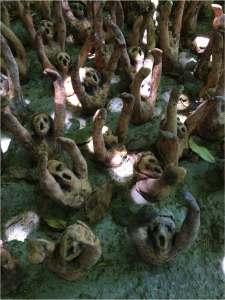
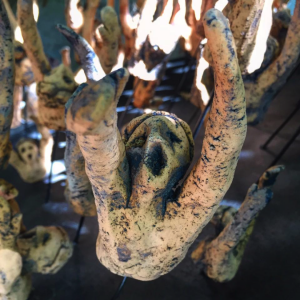
Being only in a 10 km distance from the Greek island Lesbos, the coastal area around Ayvacık became one of the main passageways used by refugees wanting to cross from Turkey to Europe. Önder and his partner Özgün live and run their art workshop (Leleg) in Assos, a small touristic settlement in the northern Aegean cost of Turkey. They say that Assos has always been an exit gate for refugees, although it has been less known in the media: “10 years ago we were only seeing their traces. They were not going out in public because of strict controls. They were crossing to Lesbos from Kadırga, in the winter, in cold and wavy days when there were no one outside. In those years, it was mostly the Afghan, Sudanese, Iranian, Palestinian, Somalian, Pakistani and so on.”
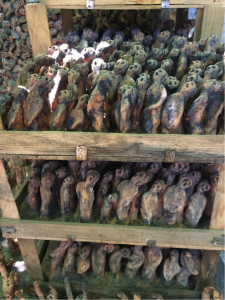
Önder started to create this collection in the winter of 2015, after witnessing the horrible summer of 2015. “That summer I hated being human. The villagers in the coastal area saw the refugees as an economic opportunity. Everyone was making money on them; if you did not, you were seen as an idiot. The local people cheated them by selling bread three times the normal price, or by driving them to Ayvacık for 100 liras, instead of 20.” A way of justifying this shameful treatment had been myths about how rich the migrants were. Yet, local people made relatively small money out of the refugees. The people who made big money were the “organizers”. According to Önder, “the big organizers were mostly people coming from outside of the region. Yet, everyone in the village somehow took part in this “business”. People who did this visibly have not been touched. They made money on the refugees and became rich. Only a shepherd and two naïve people from the village were imprisoned.” In this long summer, a new sector emerged among the fishers: “botçuluk”, meaning shipwreck hunting. Local fishermen were collecting the boats abandoned by the refugees in order to repair and sell them again to newcomers.
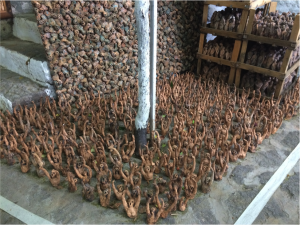
As Önder Tokuç points out, such a business could only happen by a tacit consent of the authorities: “The state turned a blind eye to the crossings. Otherwise it would not be possible. In 2015, refugees were everywhere. They were going to supermarket, walking by the gendarmerie but none of them had been stopped. Everyday 6-7 boats were crossing to Lesbos; everyone knew, yet the coast guards were not intervening.”
The art works of Önder Tokuç rise as a memorial for thousands of refugees who died desperately in the Aegean Sea and becomes a witness of the fear, agony and suppliance they went through.
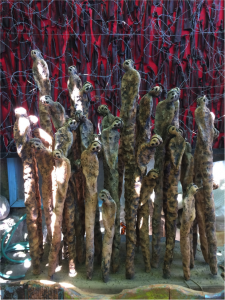
Like mermaids born in the quivering light, beautiful Syrian women set tender, wounded soles on the rocks and grey sand of Lesbos.
Come down from the fruits of al-Sham
to the rocks of pain.
•••
Brother Syrians, rolling on waves, killed on the beaches, feverish, gasping on dark shores with morning-like faces, here, in Lesbos that Troy made cry.
Come, let me kiss your cheeks, rosy with fear.
•••
Come, friends. The sand of the shores gleaming in your eyes, the East rippling golden ears of wheat in the copper of your faces. Rise as the high mountains rose in your smooth cheeks. You swing in my mind as the poplars swung in the wind of your days and the apple blossoms scattered in the gale of your crossing. Come into the darkness of Lesbos, you Syrians who emerged from the broken tablet of the alphabet.
•••
Come down, be the blood of light and the alphabet of language.
From ‘Boat to Lesbos’, by Nouri Al-Jarrah (click to read the whole poem)
